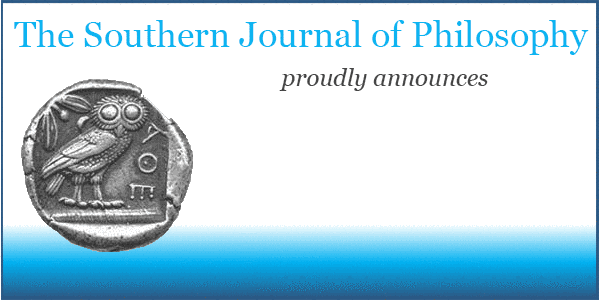Philosopher’s Annual Selections
Philosopher’s Annual is “an attempt to pick the ten best articles of the year” in academic philosophy. Volume 38, covering articles from 2018, is about to be released.
The ten articles in that volume are:- Mark Alfano, J. Adam Carter & Marc Cheong, “Technological Seduction and Self-Radicalization,” from the Journal of the American Philosophical Association
- Jc Beall, “The Simple Argument for Subclassical Logic,” from Philosophical Issues
- Selim Berker, “The Unity of Grounding,” from Mind
- Guillermo Del Pinal, “Meaning, Modulation, and Context: A Multidimensional Semantics for Truth-Conditional Pragmatics,” from Linguistics and Philosophy
- Louise Hanson, “Moral Realism, Aesthetic Realism, and the Asymmetry Claim,” from Ethics
- Remco Heesen, “When Journal Editors Play Favorites,” from Philosophical Studies
- Matthias Jenny, “Counterpossibles in Science: The Case of Relative Computability,” from Noûs
- Dilip Ninan, “Quantification and Epistemic Modality,” from the Philosophical Review
- Amia Srinivasan, “The Aptness of Anger,” from the Journal of Political Philosophy
- Kenneth Walden, “Practical Reason Not As Such,” from the Journal of Ethics and Social Philosophy
An attempt to compile a list of the best articles in philosophy is, the editors admit, “as simple to state as it is admittedly impossible to fulfill,” given the massive volume of publications in philosophy each year and the diversity of criteria that may be employed. The results are the work of roughly 70 philosophers who nominate articles for consideration for one of the top ten slots. These nominating editors often solicit suggestions from people they know (via email or social media).
The editors of Philosopher’s Annual are Patrick Grim (Center for Study of Complex Systems, University of Michigan; Logic & Formal Semantics, Philosophy, Stony Brook) and University of Michigan graduate students Eduardo Martinez, Angela Sun, and Elise Woodard.
The nominating editors this year were: Jc Beall, Ned Block, Ben Bradley, Liam Kofi Bright, Lara Buchak, Tyler Burge, Victor Caston, David Chalmers, Andrew Chignell, Therese Cory, Roger Crisp, Helen De Cruz, Cian Dorr, Adam Elga, Branden Fitelson, Graeme Forbes, John Gardner, Michael Glanzberg, Alexander Guerrero, Alan Hajek, Ned Hall, Elizabeth Harman, Gary Hatfield, Benj Hellie, Christopher Hitchcock, Des Hogan, Simon Huttegger, Brad Inwood, Simon Keller, Tom Kelly, Niko Kolodny, Jennifer Lackey, Marc Lange, Brian Leiter, Ernie Lepore, Neil Levy, Martin Lin, Antonia LoLordo, John Marenbon, Colin McLarty, Jeff McMahan, Shaun Nichols, Paul Noordhof, Rohit Parikh, Derk Pereboom, Richard Pettigrew, Duncan Pritchard, Greg Restall, Geoffrey Sayre-McCord, Barry Schein, Mark Schroeder, Laura Schroeter, Stewart Shapiro, Ted Sider, Scott Soames, Roy Sorensen, Katie Steele, Eric Swanson, Johan van Benthem, Mark van Roojen, Sergio Tenenbarum, Peter B. M. Vranas, Eric Watkins, Sam Wheeler, Gideon Yaffe, Jose Zalabardo, and Kevin Zollman.
You can view previous volumes of Philosopher’s Annual here .
(via Patrick Grim)




After a 37-year dry spell, *finally* something pertaining to aesthetics was chosen again.
Congratulations Louise!
1. As far as rankings go, this is one of the most meaningless. So I shouldn’t care about it.
2. I’m disappointed to see no papers in the history of philosophy.
3. “The food at this place is really terrible, and the portions are too small.”
I was going to comment, but the art chosen to accompany this announcement says it all, so no need! (Good job Justin.)
The final decision is made by 4 people from Michigan, 3 of which are grad students? Has it always been this way?
It certainly has been this way for many years, perhaps for the entire new run since 2007. The gap from 2003-2007 covers most of my graduate career, so I wasn’t paying attention to how it worked before then.
The 70 or so nominating editors, in addition to nominating the articles from which the winners are chosen, are also asked to rate and comment on as many of the nominated articles as they can. While the four editors make the final decisions, a large number of people provide relevant input.
If the editors admit their task if “admittedly impossible to fulfill”, why do it? There is a simple way to make the task very possible to fulfill: instead of talk of (1) “the ten best” just say, (2) “we the editors and nominating editors as a group like these articles the most.” Voila!
Given the conceptual simplicity of (2), why choose the conceptually complex and convoluted (1)? Because (1), unlike (2) supports the fantasy of “THE” standards of academic philosophy. (2) is vulnerable in the Cavellian sense of skepticism, accepting the contingency of the current structures and those who occupy prominent positions in it. (1) is the opposite of vulnerable, as if one were trying to grasp the “essence” (the best) of philosophy – and prestige is but the social recognition of that essence.
At bottom all there is is what people like or don’t like, what they are moved or unmoved by.The editors love these articles. That’s interesting to know, and will help more people read them. Great! Why muddle it with talk of best? It’s not just an issue of grad students being editors. Are the 70 nominating professors, no matter how established, in a position to know what is best, or even agree among themselves what they mean by best?
This talk of best is a relic of a bygone age. The sooner we ditch it, the more we can move forward to deal honestly with the confusing pluralities we face.